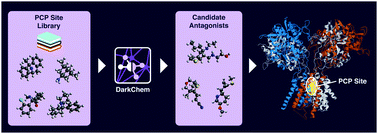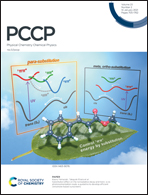Application and assessment of deep learning for the generation of potential NMDA receptor antagonists†
Abstract
Uncompetitive antagonists of the N-methyl D-aspartate receptor (NMDAR) have demonstrated therapeutic benefit in the treatment of neurological diseases such as Parkinson's and Alzheimer's, but some also cause dissociative effects that have led to the synthesis of illicit drugs. The ability to generate NMDAR antagonists in silico is therefore desirable for both new medication development and preempting and identifying new designer drugs. Recently, generative deep learning models have been applied to de novo drug design as a means to expand the amount of chemical space that can be explored for potential drug-like compounds. In this study, we assess the application of a generative model to the NMDAR to achieve two primary objectives: (i) the creation and release of a comprehensive library of experimentally validated NMDAR phencyclidine (PCP) site antagonists to assist the drug discovery community and (ii) an analysis of both the advantages conferred by applying such generative artificial intelligence models to drug design and the current limitations of the approach. We apply, and provide source code for, a variety of ligand- and structure-based assessment techniques used in standard drug discovery analyses to the deep learning-generated compounds. We present twelve candidate antagonists that are not available in existing chemical databases to provide an example of what this type of workflow can achieve, though synthesis and experimental validation of these compounds are still required.

- This article is part of the themed collection: Emerging AI Approaches in Physical Chemistry


 Please wait while we load your content...
Please wait while we load your content...